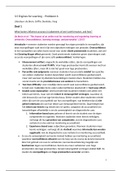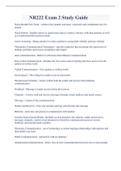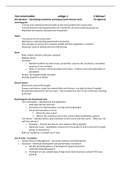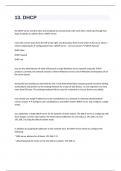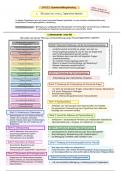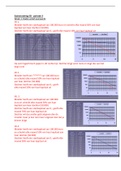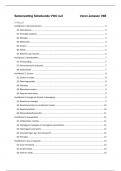Chapter 1: An introduction to Multinational Finance
1.1 The Goals of the Multinational Corporation
Multinational Corporation = MNC
Shareholder = aandeelhouder
Stakeholders = belanghebbende
Shareholders are always stakeholders in a corporation, but stakeholders are not always
shareholders. A shareholder owns part of a public company through shares of stock, while a
stakeholder has an interest in the performance of a company for reasons other than stock
performance or appreciation. These reasons often mean that the stakeholder has a greater
need for the company to succeed over a longer term.
Agency costs refer to any loss in value from conflict of interest between managers
and other stakeholders, particularly equity shareholders. These costs include the
costs of contracting and monitoring to reduce potential conflicts of interest.
1.2 The Challenges of Multinational Operations
Risk exist whenever actual outcomes can fifer from expectations.
Risk exposure of MNC:
When its assets or liabilities can change in value with unexpected changes in business
conditions.
o Political Risk
o Financial risk important financial risk is currency risk – also called foreign
exchange, forex or FX risk- if unexpected changes in currency values affect the
value of the firm.
1.3 The Opportunities of Multinational Operations
The set of investments available to the firm is called its investment opportunity set. MNCs
have many opportunities for enhancing revenues and reducing costs that are not available to
local forms: Multinational investment opportunities:
Global marketing
Access to Low-cost labour or raw materials
Flexibility in global site selection: MNCs have greater flexibility than domestic firms in
the location and timing of their investments.
Flexibility in sourcing and production: By having a diversified sourcing and production
base, MNCs can shift their inputs in response to currency movements or other
factors. Local competitors do not enjoy this flexibility.
Economies of scale and scope
Economies of vertical integration
Multinational tax planning
1
,MNCs also have advantages over domestic firms in forming and implementing their business
strategies. Here are examples of strategies for preserving or enhancing operating cash flows
through multinational operations:
Follow the customer
Lead the customer
Follow the leader
Go local
Liquidity refers to the ability to quickly capture an asset’s value.
- In a perfect financial market, rational investors have equal access to
market prices and information in a frictionless market.
Components of a perfect market:
Frictionless: a frictionless market has no transaction costs, taxes, government
intervention, agency costs, or costs of financial distress.
Equal access to market prices: if all participants have equal acces to market prices,
then no single party can influence prices.
Rational investors
Equal access to costless information
Operational efficiency: there are no drains on funds as they are transferred from one use to
another.
Allocational efficiency: Efficient allocation of capital towards it most productive uses.
Arbitrage: The simultaneous purchase and sale of the same or equivalent asset in order to
ensure a profit with no net investment or risk.
1.4 Financial Management of the Multinational Corporation
“The multinational financial manager must be knowledgeable in all of the disciplines of
business and finance, and sensitive to local norms and values.”
2
,Chapter 2: World Trade and the international Monetary System
2.1 Integration of the Word’s Markets
Integrated market: a market in which equivalent assets sell for the same price in every
location.
Segmented markets: the price of an asset is not necessarily the same in all markets
Markets are becoming more integrated across national borders (globalization)
2.2 Balance-of-Payments Statistics
Bretton Woods Conference: was the gathering of 730 delegates from all 44 Allied nations at
the Mount Washington Hotel, situated in Bretton Woods, New Hampshire, United States, to
regulate the international monetary and financial order after the conclusion of World War II.
The conference created the World Bank and the International Monetary Fund.
Balance-of-payments (BOP) statistics: Statistics compiled by the IMF to track a countries
inflows and outflows of goods, services and capital.
Trade balance: Measurement to determine if a country is a net importer or exporter.
Trade surplus: indicates that resident exporting more goods than they are importing
Trade deficit: means that residents are importing more than they are exporting
Current account: An extension of the Trade Balance which also includes the import and
export of goods, services and other income (Royalties, patents, travel compensation etc).
2.3 Exchange Rate Systems
Fixed (pegged) exchange rate system: a system whereby governments try to enforce local
currency values on market participants. If this system is maintained, the fixed rate system
reduces exposure to currency risk for companies conducting cross-border trade.
If the exchange rate of a currency falls in a fixed rate system it is called a devaluation, when
a currency rises against another currency it is called revaluation.
There are two main drawbacks of a fixed rate system:
- Fixed rates forge a direct link between inflation and employment.
- It is difficult to maintain the fixed rates when they diverge form market rates.
Floating exchange rate system: An exchange systems which allows currency values to
fluctuate according to market supply and demand without interference by government
authorities.
If the exchange rate of a currency falls in a fixed rate system it is called a depreciation, when
a currency rises against another currency it is called appreciation.
2.4 A Brief History of the International Monetary System
International monetary system: The global network of governmental and commercial
financial institutions within which exchange rates are determined.
The original mission of the IMF was to make short-term loans to countries with temporary
funding shortages or liquidity crises. The IMF has assisted many countries in times of stress.
Moral hazard: The risk that the existence of a contract will change the behaviour of parties
to the contract
3
, Chapter 3: Foreign Exchange and Eurocurrency Markets
3.1 Characteristics of Financial Markets
Financial markets are markets for financial (as opposed to real) assets (activa) and
liabilities (passiva)
Liquidity Liquidity refers to the ease with which you can capture an asset’s value
Financial markets also vary according to maturity:
Money markets: are markets for financial assets and liabilities of short maturity;
usually less than one year
Capital markets: are markets for long-term financial assets and liabilities, typically
with maturity’s one year or more.
Another dimension along which financial markets can be categorized is according to whether
they are regulated by a single country:
Financial contracts in an internal market are issued in the currency of a host country,
placed within that country, and regulated by authorities in that country.
Financial contract in an external market are placed outside the borders of any single
country and may be regulated by more than one country or by none at all.
Finally, financial markets can be categorized according to their informational and allocational
efficiency.
Operational efficiency refers to how large an influence transaction costs have on a
market’ s operation
Informational efficiency refers to whether market prices reflect information, and
thus the “true” or intrinsic value of the underlying asset.
Allocational efficiency refers to how well a financial market channels capital toward
its most productive uses.
3.2 The Eurocurrency Market
Eurocurrency market is the money market for currency outside(external credit market) of
the country where it is legal tender(wettige betaalmiddel).
Banks trading Eurocurrencies quote bid rates (bied koersen) at which they will take deposits
(Deposito is het in bewaring geven van geld aan een bank) and offer rates or ask rates at
which they will make loans to other Eurocurrency banks.
Bid - ask spread The difference between a bank’s offer and bid rates, and is less than 1/8
percent for large transactions in major currencies between large commercial banks.
Libor is a London-based benchmark(criterium) offer rate for interbank deposits.
Eurocurrency transactions fall outside the jurisdiction of any single nation. This result in a
relative absence of regulatory interference. Eurocurrencies typically have short maturities
and variable interest rates.
The interbank Eurocurrency market is very competitive. The interbank currency market is
the most liquid and operationally efficient market in the world, because of its low
transaction costs and high liquidity. Domestic lending rates are greater than LIBOR and
domestic deposit rates are less than LIBID, so Eurocurrencies pay more interest on deposits
and accept less interest on loan than comparable transactions in domestic markets.
Interest rate spreads often are quoted in basis points. 100 basis points is equal to one
percent; 100bp = 1 percent
4



